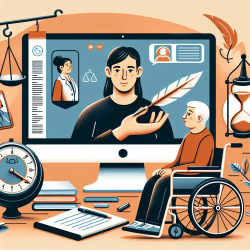Introduction
In the ever-evolving field of speech-language pathology, staying informed about historical and contemporary practices is crucial for enhancing therapeutic outcomes. The book "Casualties of History: Wounded Japanese Servicemen and the Second World War" by Lee K. Pennington offers insightful perspectives on rehabilitation practices that can inform modern online therapy services. This blog will explore how historical rehabilitation efforts can inspire and improve current practices, particularly in the context of online therapy for children.
Historical Context and Rehabilitation Practices
Pennington's work delves into the rehabilitation of wounded Japanese servicemen during and after World War II. The Imperial Japanese Army (IJA) developed a comprehensive system of military medicine that included immediate first aid, hospital treatment, and extensive rehabilitation. Rehabilitation centers provided physical therapy, vocational training, and social reintegration, emphasizing the importance of both physical and spiritual recovery.
These centers also focused on equipping veterans with skills to re-enter the workforce, offering training in various trades and professions. This holistic approach to rehabilitation underscores the significance of addressing both physical and psychological needs, a principle that remains relevant in today's therapeutic practices.
Implications for Online Therapy
Online therapy, particularly for children, can benefit from the historical lessons of comprehensive rehabilitation. Here are some key takeaways:
- Holistic Approach: Just as the IJA rehabilitation centers addressed both physical and spiritual needs, online therapy should consider the whole child. This means integrating speech therapy with other supportive services, such as occupational therapy or psychological counseling, to address a child's comprehensive needs.
- Skill Development: The focus on vocational training in historical rehabilitation can inspire online therapy programs to incorporate life skills training. For children, this might include communication skills, social interaction, and problem-solving abilities, which are crucial for their overall development.
- Community and Family Involvement: Historical practices involved the community and family in the rehabilitation process. Online therapy can enhance outcomes by engaging families in the therapeutic process, providing them with tools and strategies to support their child's progress at home.
Data-Driven Decisions in Online Therapy
Incorporating data-driven decisions into online therapy is essential for optimizing outcomes. By analyzing data from therapy sessions, practitioners can tailor interventions to meet the specific needs of each child. This personalized approach is akin to the individualized rehabilitation plans used in historical practices, ensuring that therapy is both effective and efficient.
Moreover, collecting and analyzing data allows therapists to track progress over time, identify areas for improvement, and make informed adjustments to therapy plans. This continuous feedback loop enhances the quality of care and supports the achievement of therapeutic goals.
Encouraging Further Research
While historical practices provide valuable insights, ongoing research is vital for advancing online therapy. Practitioners are encouraged to explore the latest studies and innovations in the field, integrating new findings into their practice. By staying informed and open to new ideas, therapists can continually improve their skills and the outcomes for their clients.
To delve deeper into the historical context and rehabilitation practices discussed in this blog, I encourage you to read the original research paper by Lee K. Pennington. It provides a comprehensive analysis of the rehabilitation efforts during World War II and offers valuable lessons for modern therapeutic practices. To read the original research paper, please follow this link: here.










